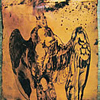James Blackshaw, "The Glass Bead Game"
 James Blackshaw has released a number of introspective and genre-defying records since his debut on Digitalis Recordings. He has, however, saved his best work for his debut on Young God. With a couple of familiar Current 93 faces behind it, The Glass Bead Game exhibits Blackshaw's experimental preferences, but also showcases his strength as an emotive and able songwriter.
James Blackshaw has released a number of introspective and genre-defying records since his debut on Digitalis Recordings. He has, however, saved his best work for his debut on Young God. With a couple of familiar Current 93 faces behind it, The Glass Bead Game exhibits Blackshaw's experimental preferences, but also showcases his strength as an emotive and able songwriter.
Why Blackshaw named his album after a Herman Hesse novel is anyone's guess. Strong religious and romantic allusions aside, Blackshaw's music is simply and strikingly hypnotic. Its mantra-like quality is perhaps the only qualification required to share a name with Hesse's meditation on the intellectual and mystical. But, this hypnotic color is something every Blackshaw record has featured; his love for the likes of Terry Riley and Erik Satie is not hard to discern and his guitar-playing style lends itself to adjectives like "rolling" and "kaleidoscopic." He has flirted with American folk music and toed the line between classical and modern guitar performances. At a young age he has explored more musical territory than many bands do over the course of an entire career. What differentiates this album from his previous efforts is the quality of the voices added to the arrangements. Accompanying him throughout are Joolie Wood, John Contreras, and Lavinia Blackwall. Flutes, clarinets, violins, pianos, and a stellar vocal performance all support and deepen Blackshaw's already sophisticated and intense approach to composition and performance. It's as if this is the band he has always wanted with him. Together with their talents, Blackshaw sounds more spectral and colorful than ever.
"Cross," the opening song, immediately communicates that Blackshaw and company are out to impress. With all pistons firing, Blackshaw paints a dramatic, but meditative melodic picture with his guitar. His strings are seemingly caught in a never-ending upward movement, each note intent on elevating the song to a higher and more introspective level. In the background, violins and cellos radiate a steady current of calm hums and ghostly utterances. Then, with just a brief pause, the band begins to weave their disparate melodic and harmonic patterns together, further enrichening the song's lively character. Each member bends their instrument, wringing from it more emotion than was present the moment before. This pattern continues until Lavinia Blackwall adds her voice to the mix. Wordlessly, she accentuates the song's beauty with eruptions of melody and effortless soul. Her voice seems to steam off of the music, occuring as a natural result of all the activity already churning beneath it. It's a stunning way to start a record and, after hearing it for the first time, I was uncertain that anything could live up to it. Smartly, Blackshaw goes into deep meditation with both "Bled" and "Fix." His nimble fingers create a ton of sound in both cases, but both songs are less showy than "Cross" and both find Blackshaw focusing on simple and direct arrangements. The latter is a brief and lovely piano-based song fleshed out by understated and cinematic string accompaniments. "Key" bridges the gap between all the previous songs and the concluding "Arc," which is as epic as anything Blackshaw has attempted before. It's moderate pace and gentle dynamics pave the way for the epic conclusion that follows.
"Arc" begins as though it were meant to be played at a funeral. Although the tones pulled from the piano are largely major and bright, they eminate an evocative quietude that only remembrance and yearning can accompany. After a short time Blackshaw's piano erupts into glissandi, as though an epiphany hit him in mid-song. As the piano fluctuates between high and low notes, the song and all of its parts develop a crystalline texture. Each of the instruments begin to blend into one another. "Arc" eventually becomes a mass of glowing sound with different elements peaking their heads above the cascade of music that's been created. The song completely destroys all sense of time and place. Instruments bleed into one another and become disassociated from their source. Whenever a particular sound rises above the others, whether its being made by a voice, an instrument, or a combination thereof can be difficult to determine. Played at loud volumes, it's an absolutely transfixing and ecstatic piece of music capable of procuring an emotional response from the listener. After I heard it for the first time, I found myself with my jaw agape and my breath left short. Something very magical happened when these musicians came together. I can only hope it won't be the last time we see Blackshaw collaborating in such a fashion. It's hard not to talk in a superlative manner about this record; it is majestic and deserving of more accolades and praise than I can possibly write.
samples:



